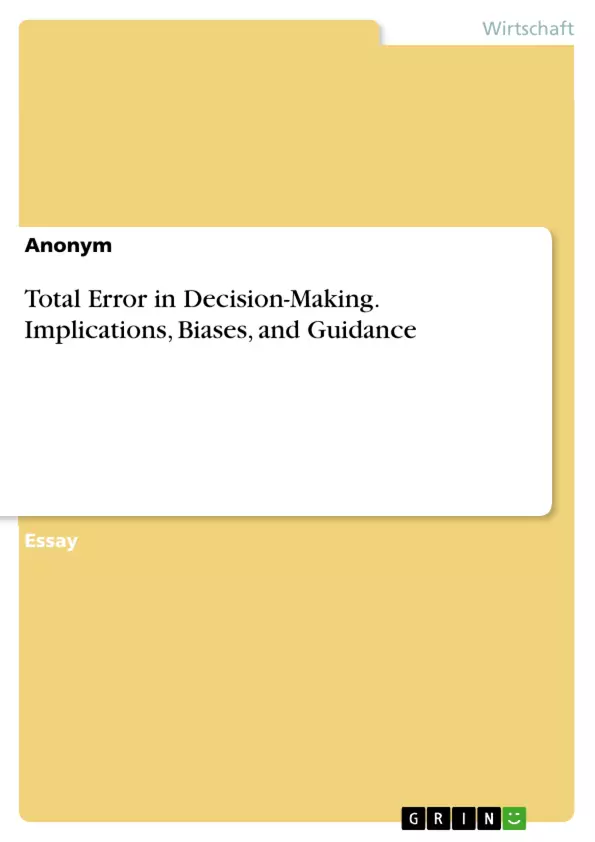This paper examines the concept of total error and its implications in decision-making processes, particularly in fields requiring precise measurements such as clinical medicine and manufacturing quality control. It delves into the sources of total error, including measurement error, and emphasizes the importance of accuracy in minimizing total error. Drawing on contributions from Deming and contemporary scholars, the paper highlights cognitive biases and heuristics that can contribute to total error, affecting judgement and decision-making. Through examples like Ai Weiwei's documentary "Human Flow," it illustrates how errors in judgement can have significant real-world consequences. Additionally, the paper provides an overview of the statistical treatment of error in science, focusing on total analytic error and bias measurement methods. Practical guidance for minimizing total error in laboratory testing is also discussed, underlining the importance of quality control procedures and continuous education for professionals in ensuring accurate measurements.
Inhaltsverzeichnis
- Total Error and Unwanted Variability in Judgement
- An overview of the statistical treatment of Error in Science
Zielsetzung und Themenschwerpunkte
Der Text befasst sich mit dem Thema des totalen Fehlers und der ungewollten Variabilität bei Urteilen, insbesondere im Kontext von Entscheidungsfindung und wissenschaftlichen Messungen. Er analysiert die Ursachen für Fehler und deren Auswirkungen auf die Genauigkeit und Zuverlässigkeit von Messungen und Analysen.
- Die Bedeutung von totalem Fehler und Messunsicherheit in der Entscheidungsfindung
- Die Rolle von kognitiven Verzerrungen und Heuristiken bei der Entstehung von Fehlern
- Die statistische Behandlung von Fehlern in der Wissenschaft
- Die Minimierung von totalem Fehler durch Qualitätssicherungsprozesse und Messgenauigkeit
Zusammenfassung der Kapitel
- Total Error and Unwanted Variability in Judgement: Dieses Kapitel stellt das Konzept des totalen Fehlers und der ungewollten Variabilität bei Urteilen vor und erklärt, wie diese durch begrenztes Rationalverhalten, Messfehler und kognitive Verzerrungen entstehen können. Es werden Beispiele aus verschiedenen Bereichen angeführt, um die Relevanz des Themas zu verdeutlichen.
- An overview of the statistical treatment of Error in Science: Dieses Kapitel beleuchtet die statistische Behandlung von Fehlern in der wissenschaftlichen Forschung. Es diskutiert die Konzepte von Präzision und Verzerrung sowie den Einfluss von systematischen und zufälligen Fehlern auf die Genauigkeit von Messungen. Das Konzept des totalen analytischen Fehlers (TAE) wird erklärt, und es werden Möglichkeiten zur Minimierung von Fehlern und zur Verbesserung der Genauigkeit von Messungen beschrieben.
Schlüsselwörter
Die Hauptthemen des Textes sind: Totaler Fehler, Messunsicherheit, kognitive Verzerrungen, Heuristiken, Entscheidungsfindung, Qualitätssicherung, wissenschaftliche Messungen, statistischer Fehler, totaler analytischer Fehler (TAE). Der Text beschäftigt sich mit den Ursachen und Auswirkungen von Fehlern und deren Bedeutung für die Genauigkeit und Zuverlässigkeit von Messungen und Analysen in verschiedenen Bereichen.
- Citation du texte
- Anonym (Auteur), 2023, Total Error in Decision-Making. Implications, Biases, and Guidance, Munich, GRIN Verlag, https://www.grin.com/document/1448972



